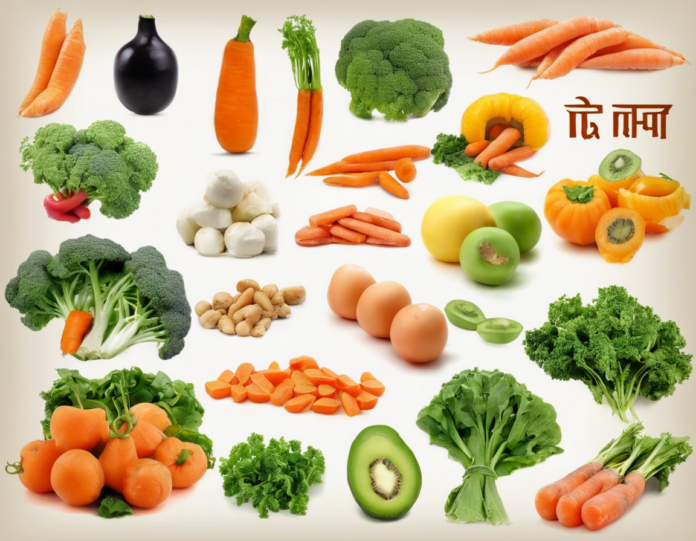Vitamin A is a crucial nutrient that plays a key role in various bodily functions, including vision, immune system support, and cell growth. It is a fat-soluble vitamin that is important for maintaining healthy skin, ensuring proper vision, and supporting the immune system. A deficiency in vitamin A can lead to night blindness, dry skin, and an impaired immune response.
Including foods rich in vitamin A in your diet is essential for overall well-being. Some of the top vitamin A foods include:
1. Sweet Potatoes
Sweet potatoes are one of the best sources of beta-carotene, which the body converts into vitamin A. One medium sweet potato can provide more than double the recommended daily intake of vitamin A.
2. Carrots
Carrots are well-known for their high vitamin A content, thanks to their beta-carotene content. They are excellent for eye health and overall immunity.
3. Spinach
Leafy greens like spinach are packed with not only vitamin A but also other essential nutrients like iron and calcium. Incorporating spinach into your diet can boost your overall health.
4. Beef Liver
Beef liver is one of the most concentrated food sources of vitamin A. If you consume animal products, incorporating liver into your diet can help ensure you meet your vitamin A needs.
5. Eggs
Eggs are a versatile food that contains not only vitamin A but also other important nutrients like protein and choline. Opt for pastured or omega-3 enriched eggs for additional health benefits.
6. Red Bell Peppers
Red bell peppers are not only rich in vitamin C but also a good source of vitamin A. They can be easily incorporated into salads, stir-fries, and other dishes.
7. Cod Liver Oil
Cod liver oil is a potent source of both vitamin A and vitamin D. It can be consumed as a supplement or added to foods for an extra nutrient boost.
8. Butternut Squash
Another excellent source of beta-carotene, butternut squash is a flavorful addition to soups, stews, and roasted vegetable dishes.
9. Mangoes
Mangoes are not only delicious but also rich in vitamin A. They make for a sweet and nutritious snack or addition to smoothies.
10. Kale
Kale is a nutrient-dense leafy green that is high in vitamin A, as well as other antioxidants and vitamins. Add kale to salads, smoothies, or sautés for a healthful boost.
11. Dairy Products
Dairy products like milk, cheese, and yogurt are good sources of vitamin A, particularly in the form of retinol. Opt for full-fat or fortified dairy products for the most benefit.
12. Pumpkin
Pumpkin is a seasonal favorite that is rich in beta-carotene, making it a great choice for boosting your vitamin A intake in the fall.
Incorporating a variety of these vitamin A-rich foods into your diet can help ensure you meet your daily nutrient needs and support overall health. Remember that while vitamin A is essential for health, it is possible to consume too much of it, particularly in the form of supplements. Consult with a healthcare provider or nutritionist if you have concerns about your vitamin A intake.
Frequently Asked Questions (FAQs) About Vitamin A Foods:
1. Can I get too much vitamin A from food sources?
While it is unlikely to consume too much vitamin A from food sources alone, it is possible to overdo it with supplements, particularly retinol. Stick to recommended daily intakes and consult with a healthcare provider before starting any new supplements.
2. Are all forms of vitamin A equally beneficial?
No, there are different forms of vitamin A, with beta-carotene being a precursor that the body converts into vitamin A as needed. Animal sources provide preformed vitamin A (retinol), which is more readily absorbed by the body.
3. Can vitamin A-rich foods help improve my eyesight?
Vitamin A is essential for maintaining eye health, and a deficiency can lead to night blindness and other vision problems. Consuming foods rich in vitamin A, particularly beta-carotene, can support eye health and function.
4. Is it possible to get enough vitamin A on a vegetarian or vegan diet?
Yes, there are plenty of plant-based sources of beta-carotene that the body can convert into vitamin A. Incorporating foods like sweet potatoes, carrots, and leafy greens can help meet your vitamin A needs on a vegetarian or vegan diet.
5. Should I cook vitamin A-rich foods in a specific way to preserve the nutrient content?
Cooking methods can affect the nutrient content of foods, including vitamin A. To preserve as much of the vitamin A content as possible, opt for gentle cooking methods like steaming or roasting instead of boiling, which can cause nutrient loss.
Ensuring an adequate intake of vitamin A through a balanced diet that includes a variety of these nutrient-rich foods can promote overall health and well-being. Remember to consult with a healthcare provider before making any significant changes to your diet or lifestyle.









